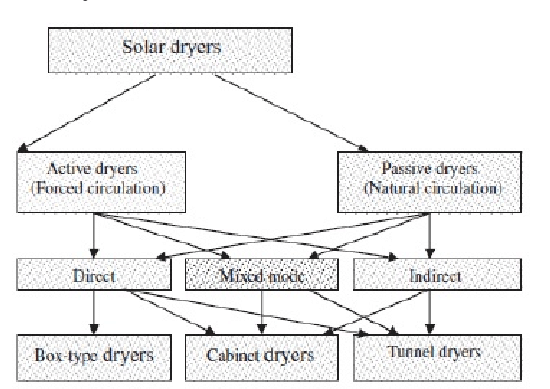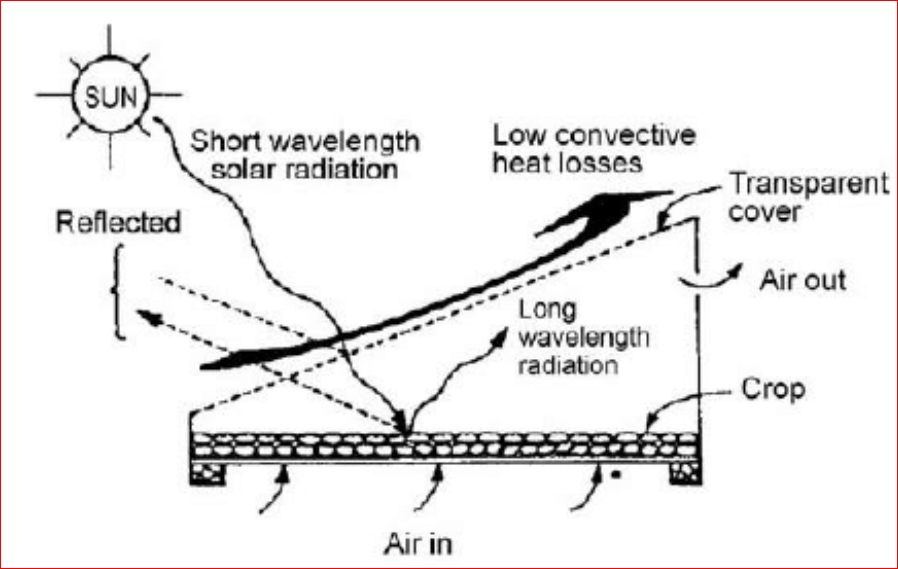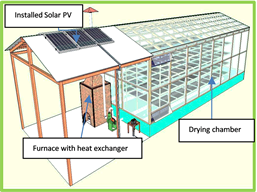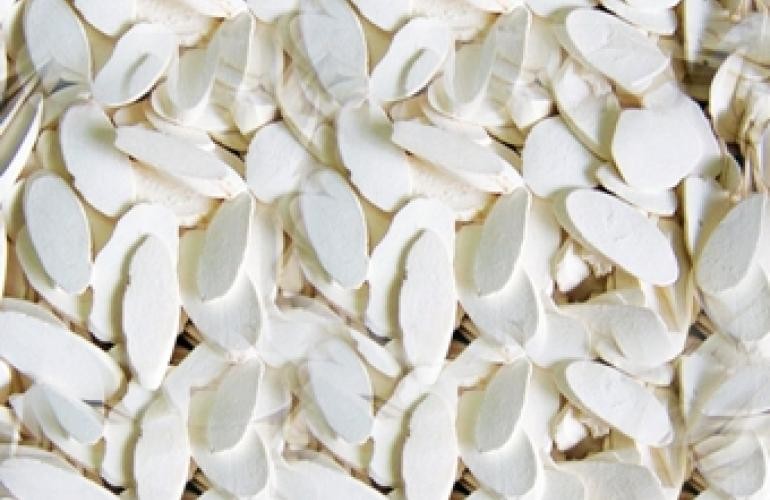Low Cost Solar Dryers
Grekkon Limited is the largest supplier of low cost solar dryers for agricultural products in Kenya . These low cost solar dryers work on solar strength, and are also augmented with a biomass heat unit if so desired by the client. Our agricultural solar dryers design is according to the product, location, and drying volume per session.
These passive or active solar dryers for fruits and vegetables are fixed or portable as the user needs it. The fixed ones are large and impractical to move about, while the portable one are small domestic drying units
What are low cost solar dryer prices in Kenya by Grekkon Limited?
We price according to size & type. The table below illustrates some sample design pricing for passive solar dryers
| Solar Dryer Size | Drying Capacity | Price of Solar Dryer |
| 1.5m x 1.5m x 1.5m | 40-50kgs | KES 70,000 |
| 2m x 2m x 2m | 50-90kgs | KES 75,000 |
| 2m x 3m x 2m | 80-100kgs | KES 95,000 |
| 2m x 4m x 2m | 90-110kgs | KES 100,000 |
| 2m x 5m x 2m | 100-130kgs | KES 120,000 |
| L X W x H |

Solar dried mango slices
Low Cost Solar Dryers in Kenya
Grekkon limited designs and constructs both passive/ natural circulation, and active/ forced circulation low cost solar dryers for agricultural products. The passive solar dryers have no additional mechanical input, while the active dryers do. Active solar dryers are also know as hybrid solar dryers. Their additional mechanical inputs are; a biomass heating unit, or solar powered exhaust plus extraction fans, and synchronizers. A hybrid solar dryer will have one (solar system or biomass heater) of these enhancements, or both. These enhance drying time by 30% to 100% compared to passive drying. Attached biomass heating units allow for night time drying, or on cloudy/ rainy days.

Solar Dryer Materials
- Light UV treated translucent polythene paper to allow heat and light. The paper also has anti-drip treatment to prevent dew formation which causes moulds to form on food
- Heavy UV treated geomembrane to conserve heat
- Steel bars galvanized with food-grade aluminum or zinc for food safety
- UV treated heavy gauge netting to prevent insect pests from entering

A simple portable solar dryer under construction by the Grekkon technical team at Rusinga Island, Homa Bay county. The local community will dry bananas for processing into flour
Below are 2 videos: The first one is of a farmer in Homa-bay county, western Kenya using a community passive/ natural circulation solar dryer to add value to banana produce. The second one is of a mango processor in Taita Taveta county at the county’s coast with an active/ forced circulation dryer. Both solar dryers are by Grekkon Limited.
Video 1. Video 2.
Our low cost solar dryers have shelves at different levels depending on the volume or weight of food crops to dry per session.
Low Cost Solar Dryer Design
What is the working principle of a solar dryer?
1. Passive/ Natural Circulation Food Solar Dryer
Grekkon Limited solar dryers work in the following steps;
i. Capture & collect the sun’s heat
ii. Create a ‘greenhouse effect’ which causes moisture loss from the produce
iii. Air coming into the dryer exits with this moisture from the vent

2 Active/ Forced Circulation Food Solar Dryer
In addition to what takes place in the passive solar drying unit, the fans force in hot air from outside, and force out hotter air combined with moisture from inside the dryer. At night or on cloudy/ rainy days, the biomass unit supplies the drying heat.

Pros and cons of a low cost solar dryer in Kenya
- Speed of drying. Food dries four to five times faster.
- Quality. As the sun’s UV rays do not get into direct contact with the drying food, the food’s; color, taste, scent, and nutritional value is unaffected
- Cleanliness. The food is free from dust, sand, or other external contaminants
- No pests. Insect, bird, or mammalian pests have no access to food in the dryer, so no attack occurs
- It is more expensive to build and maintain than open-air drying

Solar dried chilli peppers
Low Cost Solar Dryers
FAQs
I. What are solar dryer prices in Kenya by Grekkon Limited?
We price according to size & type. The table below illustrates some sample design pricing for passive solar dryers
II. How does a vegetable dryer work?
- Heat
They allow in diffused heat from the top and the sides, which heats up the air coming in from the air inlet. This hot air will exit with moisture in the air outlet.
- Anti-drip management
Our UV treated polythene cover has anti-drip properties so water droplets do not form on it. It prevents dripping on the drying food which is a precursor for fungal development.
III. What do a low cost solar dryers do?
Grekkon Limited’s solar dryers reduce the moisture content to less than 12% in these products;
- Plantation crops; coffee, rice, cassava
- Vegetables; tomato, onion, garlic, brassicas, hot peppers
- Cereals; sorghum, and millet
- Herbs; moringa, mint, rosemary
- Oil crops; groundnuts, sunflower, macadamia, cashew nuts
- Others; mushrooms, fish, beef, mutton
IV. How do you dry vegetables with solar?
- Wash the vegetables to remove all dirt
- Ensure there are no insect pests present
- Remove any diseased parts or produce
- Cut or grind them into smaller pieces to increase the drying surface area
Place them in the solar dryer holding trays

Dry cassava chips
V. What is the most popular use of low cost solar dryers?
To dry fruits, mushrooms, vegetables, herbs, spices, coffee, cassava, banana and fish. Banana and cassava are further processed into food flour. A solar dryer ensures that the food is free of any external contamination
VI. What are the main applications of a solar dryer?
Besides vegetables and fruits, commercial solar dryers in Kenya are for fish, root crops and mushroom drying. Commonly dried foods in Kenya through our solar dryers are:
i. Banana, cassava, pumpkin, millet, and sorghum to make food flour. Dried cassava is also processed for industrial starch manufacture
ii. Moringa as a medicinal herb
iii. Tomato, capsicum, traditional vegetables, kales, and spinach as vegetable nutrients
iv. Mango, papaya, as dried fruits for snacking
v. Omena which is the silver cyprinid fish for both human consumption, and as additive to animal feed
vi. Coffee so that it’s suitable for milling. Coffee solar dryers are the largest, each holding over 5 tons of berries per drying session
